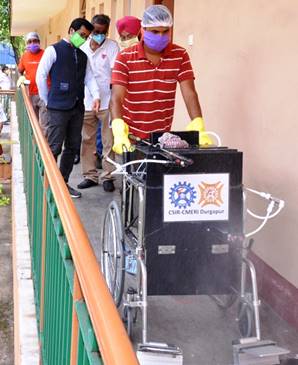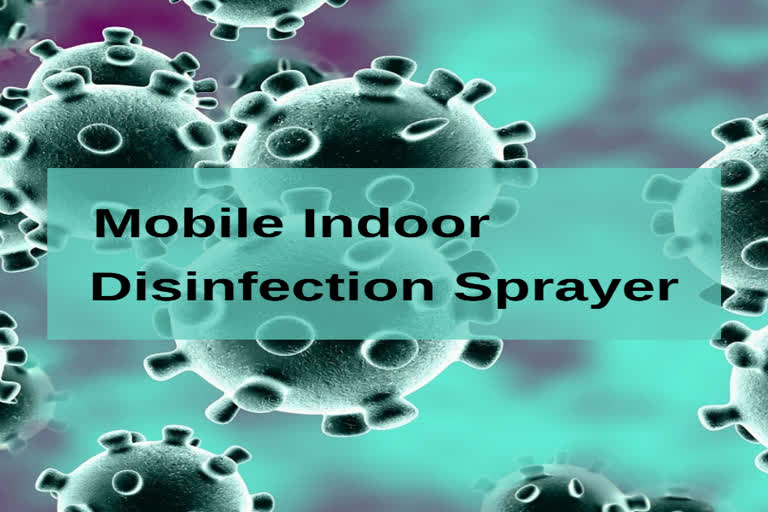Delhi, As per Ministry of Science and Technology. Scientists at CSIR-Central Mechanical Engineering Research Institute (CMERI), Durgapur, have developed two mobile indoor Disinfection Sprayer units. These units can be used for cleaning and disinfecting pathogenic micro-organism effectively, especially in hospitals.
The 2 mobile indoor disinfection Sprayer units are:-
- Battery Powered Disinfectant Sprayer (BPDS)
- Pneumatically Operated Mobile Indoor Disinfection (POMID)
These units can be used to clean and disinfect frequently touched surfaces such as:-
- tables
- doorknobs
- light switches
- countertops
- handles
- desks
- phones
- keyboards
- toilets
- faucets
- sinks, and cardboards
The Intermittent usage of these disinfecting units can help minimize the risk of transmitting Coronavirus to people who inadvertently come in contact with those surfaces.

The sprayer systems in both BPDS and POMID are designed with two-stage spraying units and separate storage tanks to clean and disinfect the indoor areas by the numbers of fixed and flexible nozzles set in the lower and upper tiers. There is also an industrial variant of the Disinfectant Sprayer for heavy usage and to cover a larger area.
POMID mobile indoor disinfectant unit is made by steel frames mounted on four wheels. This system comprises compressors, piping and fittings and spray nozzles. The hand-held flexible spray arm can be used in any direction as per requirement.
POMID unit has two storage tanks each with a capacity of 10 litres. BPDS unit is a cordless machine with a two-nozzle spray system and an extended arm spray unit. It has a storage capacity of 20 litres and a battery back-up time of 4 hours in a single charge. The gross weight of the system is (empty tank) 25 kg.
“Most of the disinfectant sprayers prevalent in the market are based either on cleaning or disinfecting using a single chamber storage for the liquid and are pump-based. The droplets produced by a pump sprayer are much larger in size and the effective coverage of surface is lesser. However, the CSIR-CMERI developed indoor sprayer systems consists of dual-chamber storage for disinfectants and cleaning and have better nozzle design, better arrangement of nozzles and lesser droplet sizes. The sprayed disinfectant can thus cover a greater surface area for the specified volume of liquid”, said Prof. Harish Hirani, Director, CSIR-CMERI.
“The particle size and the number of particles of disinfectant are two important parameters in determining the effectiveness of the sprayed disinfectant. CSIR-CMERI is consistently focussed upon developing efficient and effective technologies to contain the spread of COVID-19. The next stage of development for the devices would be to incorporate 360-degree coverage for disinfectants and cleaning spray as well as to make it compact and autonomous for usage in schools and homes”, added Prof. Hirani.
These sprayers are also equipped with mopping features and extendable arms to reach hidden area and clean comprehensively. This technology will have relevance even beyond the current COVID-19 crisis, since viruses have been existent throughout and a substantial number of cases of such influenza has been spreading throughout the globe every year. Hence, Dr. Hirani has urged the MSMEs of the nation to come forward and invest in this technology, keeping in mind the future orientation of hygiene and healthcare devices. The technology for BPDS is transferred to Power Tech Mining Pvt. Ltd. on the same day for commercialization.
Also Read: Broadening the STEM Horizons for K12 Education in India through Mini Science Centre



